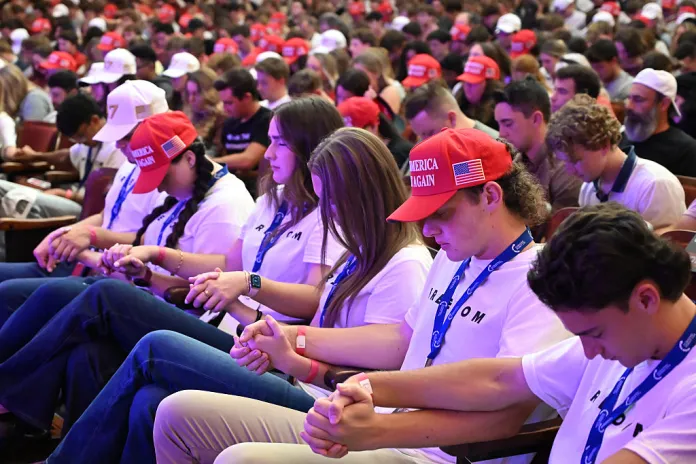


The collapse of community and the crisis of belonging comprise the biggest stories of the past 50 years. In 2000, Bowling Alone: The Collapse and Revival of American Community sounded the siren on this crisis — the long-term decline of “social capital,” as author Robert Putnam put it. If you read the book closely, you learned that the primary source of civic activity in the United States was the church.
Our growing alienation and decreasing neighborliness isn’t a story about bowling leagues, then — it’s a story about secularization.
Recommended Stories
- The violent resistance to enforcing immigration law
- Burgum hails Pennsylvania as energy powerhouse at Shale Insight Conference
- Charlie Kirk’s killer and a faithful father’s terrible duty
The collapse of marriage and family formation is the biggest story of the next 50 years. Analysts and partisans desperately sell solutions like universal day care or reindustrialization. Economics matter, but the economic accounts of the baby bust and retreat from marriage all prove inadequate.
The best predictor of getting married, having children, and having a bunch of them, is church attendance. So perhaps the best explanation of our baby bust is that we are more secular and less churchy than in the past.

If you want to address our crises of community and family, then you need a religious revival in the U.S. No Federal Department of Local Community Cohesion will do the trick. Uncle Sam will only be able to nudge the needle a tiny bit on birth rates and marriage rates.
The unchurching of America is behind most of our cultural pathologies. Our broken politics is downstream of our secularization. President Donald Trump is what replaced the religious Right. There’s a reason his campaign rallies, especially early in the 2016 primaries, felt like religious revival: This was where his relatively unchurched core followers found connection, community, and meaning.
Our atomized, alienated, hyperindividualistic society is what we should expect from a people who are deprived of what church provides: opportunities for service, weekly gatherings with people you didn’t necessarily choose, and regular reminders that we are embodied, familial, relational, and communal beings.
We are a less trusting culture, also because of secularization. Years after Bowling Alone, Putnam wrote a lesser-known book called American Grace, which reported how churchgoing people are more trusting and trustworthy than their nonattending counterparts.
We are unforgiving because mercy is now a foreign concept, and the teachings of Jesus are forgotten.
My two most recent books, Alienated America and Family Unfriendly, were about the crisis of belonging and the baby bust, respectively. For good reason, both books end in a church. When pressed on a book tour for solutions, I shrugged and said, “We need a 21st-century Great Awakening.”
I shrugged because I didn’t really think it was possible. The march of secularism can seem so irreversible, though, and so this prospect of a spiritual reawakening seemed abstract — almost a vain hope.
But if anything on this Earth ought to be capable of resurrection, it’s Christianity. If anything could persist through shifting sands of cultures and different whims and flaws of our earthly princes, it’s the Abrahamic religions.
Charlie Kirk’s death may have just ignited a flame of faith that could burn over much of America.
After Kirk was murdered, in part for his Christian beliefs, those about gender and marriage and sexuality that are out of fashion but have been taught by all major faiths for millennia, many commentators and mourners focused on his later work to inspire young men back to church.
“After Charlie’s assassination, we didn’t see violence,” his widow, Erika Kirk, said in her oration at his memorial service. “We didn’t see rioting. We didn’t see revolution.
“Instead, we saw what my husband always prayed he would see in this country. We saw revival.
“This past week, we saw people open a Bible for the first time in a decade. We saw people pray for the first time since they were children. We saw people go to a church service for the first time in their entire lives.”
Among our media class, other elites, and some on the Left, this is a bit scary or foreign. The liberal project, for decades, was to push us towards a more secular, more rational society that leaned less on dogma, tradition, and faith. This was supposed to be emancipatory. Enlightenment would free us from the dark fire and brimstone messages of Protestant preachers and Catholic or Jewish guilt.
That didn’t work.
RFK JR. MAKES PREGNANCY HARDER
Americans, especially young, secular, college-educated people, are more anxious than ever, less hopeful than ever, and more judgmental than ever. The abolition of Judeo-Christian sexual ethics didn’t create a happy free-love utopia — it created a broken world with a hundred #MeToo stories.
Our culture is broken, and it needs a fix. And in the moment, it seems possible that this fix may come not from technology, not from our government, not from the market, but from millions of Americans spending reverent time in the pews and in prayer.
